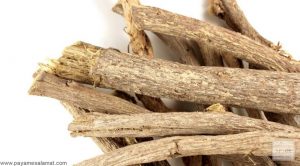 Licorice is one of the herbs of the car and is less cultivated. Its leaves are compound and consist of 4 to 7 pairs of leaves plus one terminal leaf, which are sticky due to sap secretion. The flowers are purple, yellow or purple or bluish-white and the fruit contains 5 to 6 seeds. Its root and underground stem are of medicinal use
Licorice is one of the herbs of the car and is less cultivated. Its leaves are compound and consist of 4 to 7 pairs of leaves plus one terminal leaf, which are sticky due to sap secretion. The flowers are purple, yellow or purple or bluish-white and the fruit contains 5 to 6 seeds. Its root and underground stem are of medicinal use
Therapeutic effects: This plant has softening, sputum, anti-inflammatory and laxative properties and has been used effectively in gastrointestinal and duodenal diseases. Also in the treatment of upper respiratory tract infections, bronchitis, peptic ulcers, duodenal ulcer, chronic gastritis , Rheumatism, arthritis and adrenal insufficiency are used. The products of this plant are widely used in medicine as a supplement for taste and for adhesion of pills.
Licorice has good effects in the treatment of skin lesions such as dermatitis, eczema and itching, antiseptic, antiseptic, antibacterial, hepatotoxic, antiviral and antiphlogistic effects. Gastric and anti-cough are used. Glycyrrhizinic acid in this plant is effective in preventing Helicobacter pylori, in the treatment of gastric ulcer, gastric mucosal problems and gastric acid reduction
